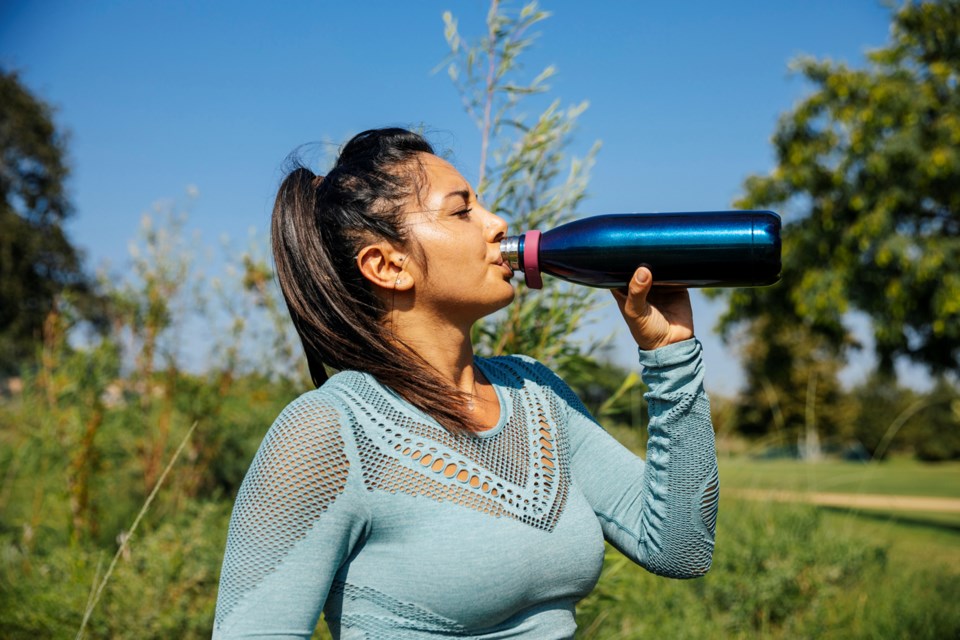I know the topic of how much water to drink is always controversial, and I don’t claim to be an expert on the matter at all. This is just my passionate opinion. I love and appreciate water.
My go-to comment whenever one of my household members complains of not feeling well, or is abnormally tired is “When did you last drink water?” And the answer is usually “I don’t know” or “Does coffee count?” Then I roll my eyes and launch into my lecture on the importance of hydration.
We are made of mainly water so it makes sense that we need to replenish the water in our body, as we are constantly using it. Our body uses water to help us digest food, regulate our body temperature, transportation and absorption of nutrients, create saliva and blood circulation… We lose fluid constantly through breathing, urine, stool, skin evaporation, exercise (sweating), in warm climates, in higher altitudes etc.
Also, as we age our sense of thirst decreases. I often visit my elderly mother in the late afternoons and I always ask her if she has had water that day. Usually the answer is no, because she wasn’t thirsty. But she had consumed a couple cups of black tea to boost her lagging energy – which she attributes to being old, not dehydrated. And by that time in the day, she doesn’t want to drink water because she thinks she will be up all night with trips to the bathroom. This is a crucial health issue for many elderly people (or anyone for that matter). If you are worried about disturbed sleep, drink your water in the morning and early afternoon. And for those of you afraid of getting wrinkles, the cells in our skin need water to stay plump so drink enough to keep them hydrated. My mother is vain enough that maybe if I share this fact with her she will drink more water. It is recommended that the elderly drink 1.7 litres of water a day. If elderly need this much water for their sedentary lifestyle, then it makes sense that younger people need more because of their increased activity and body function.
Too many people have substituted water for juice, pop, coffee, tea, beer and other beverages. Even though they may quench your thirst initially, many of these other liquids cause other harmful reactions in the body in the body like elevating heart rate and blood pressure, affecting the liver, creating too much acid, raising blood sugar and stressing the pancreas (which then needs to produce additional insulin) etc. Any liquid we put into our body needs to be converted into water, and this requires energy to filter everything else out. Think of your intestine walls and your kidney like a Brita water filter. I once had fun pouring a mixture of every liquid I had in my kitchen (including hot sauce, soy sauce, ketchup, pop…) into the top of my Brita to see what it would taste like when it drained through – and guess what? The final product tasted like plain water. I ruined the filter but it was a fun experiment and showed me what our body has to do with all liquid we put into it.
A couple ways to tell if you are dehydrated, even if you aren’t thirsty: Pinch up the skin on the back of your hand and see how long it takes to go back to normal. If more than a couple seconds, then you are probably deficient in water. Also, notice the frequency of urination and the strength and colour of your urine. If you aren’t voiding almost hourly or your urine is darker than normal or stronger smelling, then you may not be consuming enough water. By the time we are thirsty, we are starting to be dehydrated. Your brains communicate with your kidneys, determining how much water to retain for survival, and how much to excrete as urine. And in the process of dehydration many other body functions are affected, but I don’t have room to discuss all the harmful effects of dehydration in this article.
Sipping water throughout the day rather than drinking a lot over a short period of time allows the body to efficiently process the water and properly hydrate, without the increased urination from gulping.
Water plays such a huge role in maintaining human health (and of all life forms). Humans can survive without food for many weeks but only for a few days without water. Water is much more essential to our survival than food. Every cell in our body needs water as our health longevity relies on it.
All this being said, there is such a thing as too much water. If you are urinating very frequently and your urine is very pale without any odour then you may be depleting your electrolytes and essential sodium. The trick is to find a happy healthy balance for optimal health.
Water is truly the Elixir of Life and we are so incredibly fortunate to have an unlimited supply of fresh clean drinking water in Canada (or at least the technology to create it). To your health and optimal hydration
Claire Nielsen is a health coach, author, public speaker and founder of www.elixirforlife.ca. The information provided in the above article is for educational purposes only and is not a substitute for professional health and medical advice. Please consult a doctor or healthcare provider if you're seeking medical advice, diagnoses and/or treatment.

